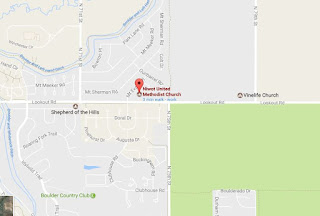(I took this photo at the recent Open House at the Islamic Center of Boulder)
I don't know why it often takes tragic events to make us feel like we need our neighbors, but often it does. Over the weekend, many neighbors from all faith traditions gathered outside the Islamic Center in Fort Collins after news reports of its being vandalized. They were all there to show their Muslim neighbors their support. "It's what neighbors do," I heard someone say on a news report.
Many of us can recall stories about how in the days after tragic events like wars or mass shootings or 9/11, people found ways to connect with their neighbors to 'do good' in ways they hadn't before.
Many of you can recall such experiences, perhaps in more distant years,like the JFK assassination or the war years of the 1940s. Times of intense public unity are often times of intense public trial. We realize that we are not in it alone and that someone else is going through the struggle with us.
It's why people in communities tie yellow ribbons on trees to remember those gone to war, or when a child goes missing from the neighborhood, etc. It's a way to show the tie that binds a neighborhood. A common purpose.
But what constitutes a neighborhood? Is there an actual borderline on who is a neighbor?
In Grounded by Diana Butler Bass, she says, "People create neighborhoods when they gather together beyond family ties, live close to others, and choose to share certain resources (in the contemporary world, those resources include, for example, electricity, schools, roads, places of worship, stores and often a park or some other commons)."
And what of the idea that God is a part of the neighbor and the neighborhood around us?
"If we understand that neighborly relations are woven into divine love, then we can grasp that God is, essentially, a near-dwelling God." --Diana Butler Bass
It is worth noting that we say that God abides with us and that abide and abode are essentially the same word. Our home has God in it and God is also in the neighborhood. It is important in a world that feels ever more isolating that we see the command to love our neighbors as probably the most important part of being faithful to God. Many religious leaders agree. In fact, Pope Francis has made the command to love God and love neighbor a centerpiece of his papacy.
And in this day and age of isolating lives and garage door openers and social media neighbors, the question "Who is my neighbor?" is more complex and difficult to answer than ever. Because of technological advances in who we connect to, our neighborhood is no longer tied to simple geographical proximity. And ironically, perhaps, it is that vast global neighborhood that has led us to retreat to our homes. We are intimidated by the vastness of our neighborhood in today's terms.
The word neighbor comes from Old English roots and it means "near dweller" Someone dwelling nearby, But in today's world, does that mean physically near? How has technology changed what a near dweller might be? Neighborhoods are made up of real people who already are, in one way or another, intersecting our lives. Whether they live near or far away.
"All of the world's religions make neighbors the central concern of spirituality and ethics. Love of God and neighbor are absolutely intertwined."--Diana Butler Bass
Christianity, Judaism, and Islam all have passages in their sacred texts that point to an expanded definition of who we think our neighbor is. In the Good Samaritan story, Jesus expands the idea of neighbor to include someone who is shunned by his own group. An outsider. He presses the point of neighborliness being tied to kindness and mercy, rather than what we have in common or what group we belong to. In the Qur'an, there is a scripture that says "Worship God and join none with HIM in worship, and do good to parents, kinsfolk, orphans, the poor, the neighbor who is near of kin, the neighbor who is a stranger, the companion by your side, the wayfarer that you meet. (Qur'an 4:36).
Who is my neighbor is an age-old question that people struggle with in each generation, despite the commandments of their faith traditions to love neighbor as self.














